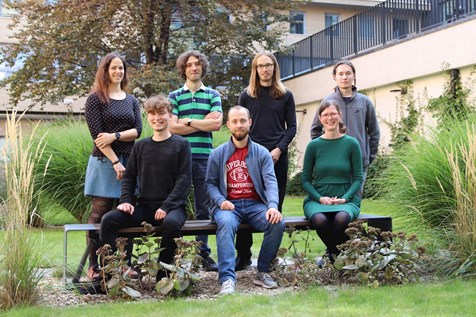High-Performance Computing Research Group
"We find ways how to accelerate the research of other scientists."
We are researchers focused on Scientific and High Performance Computing. Our aim is to develop methods for automatic improvement of code performance for conventional CPUs and GPU accelerators.
We develop several program tools for making general software faster, such as Kernel Tuning Toolkit, or cuFFTAdvisor. We also develop, optimize and accelerate simulation methods and tools used in computational chemistry and biology, such as CaverDock, 4D-GRAPHS, Xmipp software and Umpalumpa.
The strength of our work is in innovative approaches in an acceleration of existing implementations, connecting domain expertise with solid knowledge of HPC techniques, and openness of our solutions to the community.

Our research interests cover a wide area of high performance and scientific computing.
Primarily we focus on automatic code parallelization and performance optimization - we develop tools for autotuning at level of source code and data, programmability, and automatic distribution and tuning of image processing pipelines. We also focus on improving performance of selected computational problems from chemistry and biology by code optimization, parallelization (mainly single-node parallelism) and GPU acceleration. In certain cases, we formulate a brand new algorithms or mathematical approaches, to solve given problems faster.
- Methods for Automatic Code Optimization
- Runtime Systems
- Performance Engineering
- Performance Prediction Methods
- Computational Chemistry and Biology
- Real-time Simmulations

We develop our own CaverDock software, which enables to compute trajectory and energy profile of a ligand passing through protein's cavity faster than with molecular dynamics.

Together with Spanish National Center for Biotechnology, we collaborate on GPU acceleration of Xmipp, unique software for image reconstruction in cryo-electron microscopy.

Kernel Tuning Toolkit (KTT) is an autotuning framework for OpenCL, CUDA and Vulkan kernels and GLSL compute shaders, which allows to modify kernels’ source code in runtime (dynamic autotuning), allowing applications to adapt to changing data and much more.
2025
-
Estimating resource budgets to ensure autotuning efficiency
PARALLEL COMPUTING, year: 2025, volume: 123, edition: March, DOI
2024
-
A methodology for comparing optimization algorithms for auto-tuning
Future Generation Computer Systems, year: 2024, volume: 159, edition: October 2024, DOI
2023
-
Umpalumpa: a framework for efficient execution of complex image processing workloads on heterogeneous nodes
Computing, year: 2023, volume: 105, edition: 11, DOI
2022
-
Improving ligand transport trajectory within flexible receptor in CaverDock
SAC '22: Proceedings of the 37th ACM/SIGAPP Symposium on Applied Computing, year: 2022
-
Using hardware performance counters to speed up autotuning convergence on GPUs
Journal of Parallel and Distributed Computing, year: 2022, volume: 160, edition: February, DOI
2020
-
A benchmark set of highly-efficient CUDA and OpenCL kernels and its dynamic autotuning with Kernel Tuning Toolkit
Future Generation Computer Systems, year: 2020, volume: 108, edition: July, DOI
-
CaverDock: A Novel Method for the Fast Analysis of Ligand Transport
IEEE/ACM Transactions on Computational Biology and Bioinformatics, year: 2020, volume: 17, edition: 5, DOI

Our research is largely linked to collaboration with other research groups from various scientific disciplines. Our partners are mainly scientists a researchers from the field of Life Sciences both from Masaryk University and from other Czech and Europe research institutions.

Loschmidt Laboratories is a research group based at the Faculty of Science of Masaryk University in Brno, which focuses on protein and metabolic engineering for biomedicine. Together we work on the development of CaverDock software.

The Spanish National Centre for Biotechnolgy (CNB) is distinguished by its versatile interdisciplinary research that combines molecular biology methods with the latest technology in the fields of functional and structural biology – Xmipp software is our common project.

Together with Central European Institute of Technology (CEITEC), a dynamic center of scientific excellence in the field of life sciences, we collaborate on acceleration of 4D-GRAPHS and searching for new antibiotics.
Interested in Our Research? Join Us!
We are searching for new colleagues for various positions who would work with us on exciting projects, develop unique software and solve unconventional problems. In case of interest, contact filipovic@ics.muni.cz.


RNDr. Jiří Filipovič, Ph.D.
Leader of HPC Research Group
Jiří focuses on all topics covered by the group. He leads research activities and mentors students. He is the main author of CaverDock and the profile-based searcher in KTT. Additionally to his research activities, he teaches classes focused on programming accelerators in CUDA and OpenCL at the Faculty of Informatics, Masaryk University, and OpenCL part of the HPC class at the Faculty of Computer Science, University of Vienna.

Ing. Jana Hozzová, Ph.D. | Postdoc
Jana researches autotuning and develop CaverDock. She also works with chemists on simulations of molecular docking and metadynamics and the classification of NMR data.

RNDr. David Střelák, Ph.D. | Postdoc
David develops GPU accelerated Xmipp. He is also the main author of the Umpalumpa framework, which allows automatic distribution and autotuning of image-processing pipelines.

Mgr. et Mgr. Jaroslav Oľha | Ph.D. Student
Jaroslav's research focuses on scheduling in autotuning. He is formulating the predictive modeling of autotuning costs and benefits.

RNDr. Petra Němcová | Ph.D. Student
Petra focuses on research in the field of modeling transport processes in proteins. She develops the next version of CaverDock, which allows protein flexibility.
